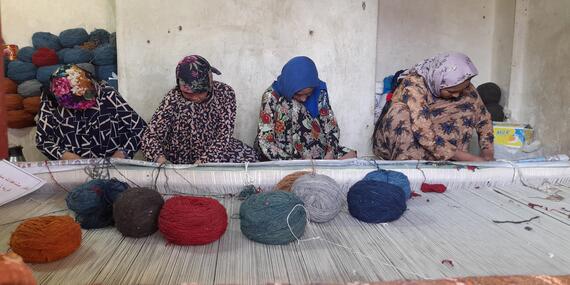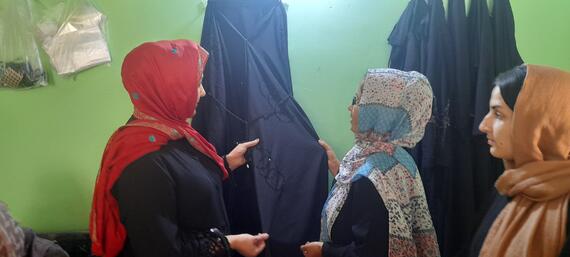Afghanistan: English teacher hopes to create opportunities for women

Atun* is a wife, a mother, a humanitarian and a passionate teacher of English. She loves what she does, but it comes with many challenges.
She explains: "I work with women and girls on programmes that provide them with vocational skills. But it’s not enough. Education is also important for girls and women; without it they won’t be able to realize their dreams and full potential.”
Atun has worked with an international non-governmental organization (INGO) for eight years. Initially she taught primary-level English to girls, and then worked as a trainer on sanitation and hygiene. Since 2022, she has been a Local Resilience Officer with the same INGO. Atun advises how projects related to economic opportunities and innovation, such as greenhouse farming, rug making and embroidery, can be better implemented to support different communities’ needs, especially women and girls.
With her husband out of work, Atun is the family’s sole breadwinner. She also made the brave decision to homeschool her 10-year-old twins – a boy and a girl – to help maintain some equity in their education. Since September 2021, the Taliban de facto authorities have banned girls from attending secondary school – effectively halting their education after sixth grade (age 12).
Atun’s passion for English stems from her childhood, when she had an opportunity to learn at a nearby language centre, and from her brother and his friends at home. She later pursued a degree in chemical engineering, but her first love remained English. She taught it to students as a volunteer on campus before joining her current organization, where she continued teaching English full time and then in her spare time.
But this all came to an end in 2021 when the Taliban imposed the ban on girls’ education.
"It was hard for the girls to attend these classes, and many missed classes so often, so the programme had to shut down,” said Atun.

She also explained that it’s still a struggle for women who attend vocational trainings, as they are harassed for wearing hijabs and not having a mahram (an older male who must accompany a woman to all activities outside her home).
This reality doesn’t escape Atun when she does errands and goes to work and even to the hospital.
She explains: “Because my husband is taking care of our children and I’m the one working, I usually have my neighbour’s son take me to work every day, and we are often stopped and questioned [by the de facto authorities] because he is 17 years old. I cannot even go to the bazaar to buy things without my husband and now my children, because we don’t have someone to leave them with.”
“The women, for lack of other options, tolerate this,” she adds, with a sigh.
Despite these challenges, Atun still harbours ambitions to undertake a master’s degree in English and then teach the language to more women, which would give them opportunities they currently miss out on, such as online employment.
Due to the harsh restrictions Afghan women face, many do not have the vocational skills to find informal work, or the capital to start their own business. The women and girls in Atun’s local recovery resilience programme come from different backgrounds; some went to school but didn’t complete their education, while others had jobs they cannot go back to. They must now start again from scratch to pick up the technical know-how to make their way in the world.
Atun still hopes that one day she can teach these women English, which she believes is an avenue to expand their cottage industries. They’re learning to manage the value chain of their work. For example, in rug making they curl the wool, weave the rugs and then sell them at local markets. As carpets and rugs are a huge source of income to Afghanistan from exports and international markets, women who have practical experience and can trade in English could make a living if given a chance.
“My fellow women, seize the opportunity to work wherever possible,” said Atun. “Support your communities and people and continue to be strong women in society; one day, all these restrictions from the de facto authorities, including the restrictions on women's movement and dress code, will be lifted. In the meantime, work hard and maintain optimism."
*Name has been changed.
